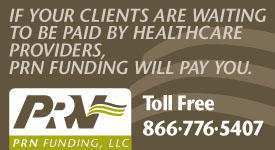 Now more than ever, private duty care agencies and home healthcare companies need cash flow to sustain their operating expenses, such as payroll, rent, utilities, and insurance, and marketing and advertising costs. Unfortunately, at the same time that private duty home healthcare agencies need money the most, there’s a drought in traditional business financing opportunities. This scarcity in available financing is forcing business owners to take a more creative approach to securing money.
Now more than ever, private duty care agencies and home healthcare companies need cash flow to sustain their operating expenses, such as payroll, rent, utilities, and insurance, and marketing and advertising costs. Unfortunately, at the same time that private duty home healthcare agencies need money the most, there’s a drought in traditional business financing opportunities. This scarcity in available financing is forcing business owners to take a more creative approach to securing money.
The Accounts Receivable Factoring Alternative
Fortunately, there is an excellent alternative underutilized financing option that can keep a company’s cash flow going – private duty care accounts receivable factoring. As opposed to a more tradition form of financing, such as a small business loan, private duty care accounts receivable financing is not a loan at all. In this type of funding arrangement, a factoring firm purchases the rights to the private duty agency’s invoices, advances cash immediately on those invoices and then collects on them.
The best part about accounts receivable financing is that credit decisions are based on the creditworthiness of the private duty agency’s customers (i.e. Medicaid, VA or other governmental agency,) rather than the agency itself or the business owner’s personal credit. This allows the business owner to leverage the higher quality of their customers’ credit in securing funds. (NOTE: Private duty care factoring companies cannot purchase invoices that are payable directly by individuals because evaluating the credit of an individual is far more difficult than leveraging the government’s creditworthiness).
Keep in mind that many private duty care factoring companies can also work with start-up companies. In addition, small and large companies that are going through a rapid growth phase can also factor their private duty care receivables. What’s more, many factoring firms are able fund receivables without requiring the private duty agency owner to sign a personal guarantee, which lets the owner protect his/her personal assets. What’s more, private duty care factoring arrangements tend to provide generous lines of credit because factors are able to set credit limits and increase their funding as their clients’ businesses grow.
So How Does Private Duty Care Factoring Work?
Let’s say that the owner of a private duty care agency sent employees into an elderly person’s home to assist that person throughout his/her daily activities. The agency owner then bills Medicaid for the services provided. Because it takes time between when the agency owner sends the invoice and when Medicaid actually pays for the home care services, the agency owner can sell that invoice to a private duty care factoring firm and receive roughly 80 percent of what was invoiced immediately. In turn, Medicaid payments are sent to the factor. Once the factor is paid, the firm will deduct its fees and return the balance back to the agency owner.
Factoring firms come in all different shapes and sizes, and they are spread out all over the country, and each offers their own twist to the invoice funding model. Therefore, it’s important to take the time to research factoring companies and select the best one to meet your private duty home care agency’s financing needs.
In a time when more banks and credit card companies are saying “no,” private duty home care agency owners should look into accounts receivable factoring as a viable alternative financing option.
 Nikki Flores is a Consultant Liaison for PRN Funding, LLC, which is an extraordinarily focused niche player in healthcare factoring.
Nikki Flores is a Consultant Liaison for PRN Funding, LLC, which is an extraordinarily focused niche player in healthcare factoring.
PRN Funding exclusively factors the accounts receivable of companies that sell goods or provide services to healthcare providers.


Speak Your Mind